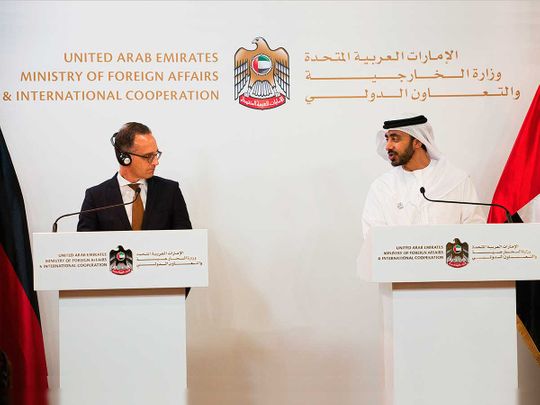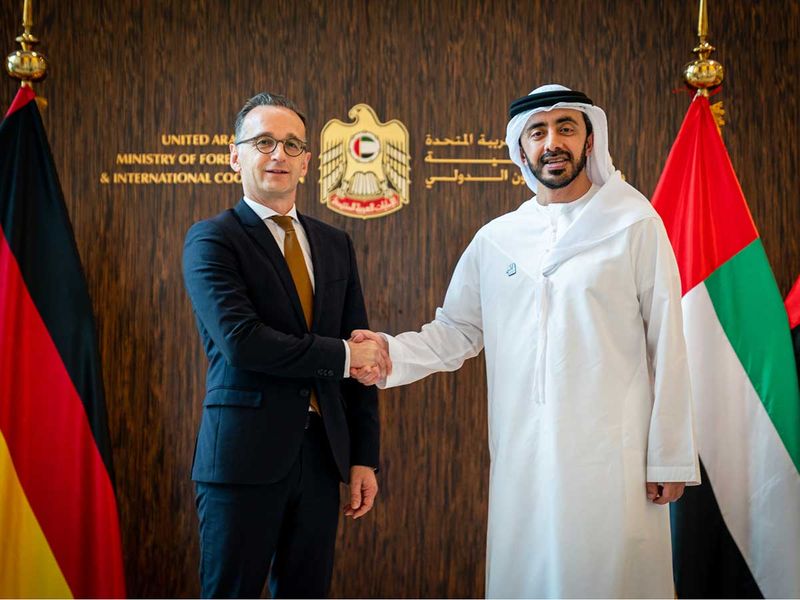
Abu Dhabi: As tensions soar in the region already shaken by a standoff between the US and Iran over the nuclear deal, the UAE and Germany on Sunday called for defusing the situation to prevent further escalation and enter into negotiations.
“We believe the region – hard-hit by tensions, conflicts and wars – should get a big chance for diplomacy, dialogue and hope for a better future,” Shaikh Abdullah Bin Zayed Al Nahyan, Minister of Foreign Affairs and International Cooperation, said at a joint press conference with his German counterpart, Heiko Mass.
Shaikh Abdullah urged friends and allies — Germany and the five permanent members of the UN Security Council — to assume greater role in making these efforts successful and spreading peace and prosperity in the region.
The German Minister said that Europe has a united stance to keep the nuclear deal with Iran alive.
Shaikh Abdullah said countries of the region must be part of the nuclear deal with Iran.
Broader issues
“Broader issues must also be included in the deal, such as the Iranian ballistic missiles, supporting terrorism and meddling in the internal affairs of other countries,” Shaikh Abdullah said.

Shaikh Abdullah was speaking after the UAE told UN members that a state was likely to be behind “sophisticated and coordinated” attacks on four tankers off its coast last month.
The May 12 attacks targeted two Saudi tankers, a UAE vessel and a Norwegian tanker, causing no casualties but fuelling tensions in the region.
Limpet mines
The attacks required expert navigation of fast boats and trained divers who likely placed limpet mines on the vessels under the waterline to incapacitate but not sink them, according to the preliminary findings of a joint investigation by the UAE, Norway and Saudi Arabia.
In a briefing document given to UN security council members, the three countries did not say who they believed was behind the attacks. Iran has been accused by the US of being responsible.
Shaikh Abdullah said the attacks not only targeted four vessels, but also undermined the international maritime safety.
“When the attacks occurred, there were more than 184 vessels off the Fujairah port, docked for fuelling before sailing through the Strait of Hormuz.
"We in the UAE welcome any role assumed by Germany and others to defuse tension. Meanwhile, the UAE, Saudi Arabia and Norway along with other partners will continue to provide the Security Council with the results of the investigation into the attacks,” Shaikh Abdullah said.
Haas said he did not want any misunderstanding to lead to a military confrontation.
Working to defuse tension
“We all work for defusing tension and prevent military escalation in the region and this issue will be taken up during my visit to Iran.”
Although Shaikh Abdullah did not blame Iran directly for the attacks on four vessels off the coast of Fujairah, and despite Iranian denials, intelligence from Washington suggested that Tehran was perhaps behind it.
“While investigations are still ongoing, these facts are strong indications that the four attacks were part of a sophisticated and coordinated operation carried out by an actor with significant operational capacity, most likely a state actor,” a document submitted to the Security Council said.
The countries believe the attacks were the work of several teams of operatives who coordinated the timed detonation of all four explosive charges within an hour.












